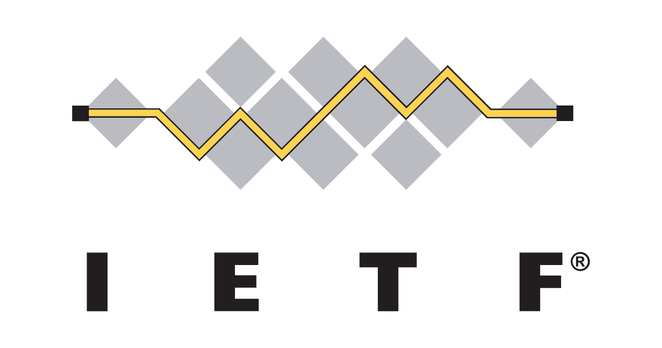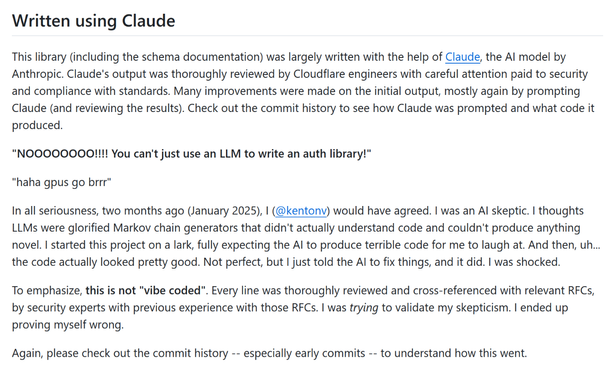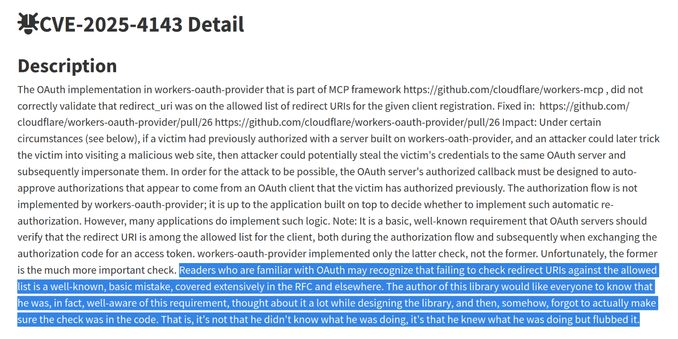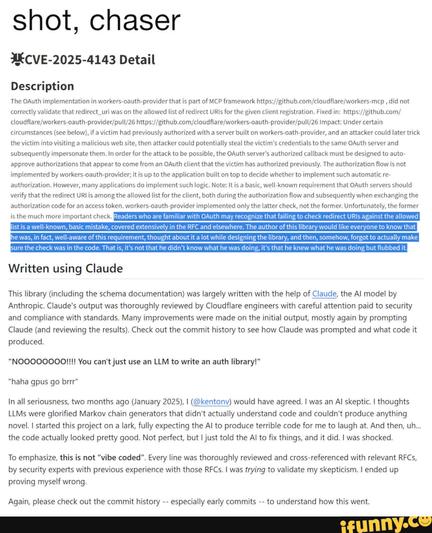He didn't know what he wasn't doing because knowing what he should have been doing made him think he knew what he was doing.
Why you would start a project with possibly error-riddled initial state and then iterate with possibly error-riddled improvements I don't know.
@SorceryForEva @s0 @gsuberland @hailey that's been my biggest objection to using AI as a coding agent for quite a while now.
Personally, I find writing my own code easier and less stressful than debugging others' code.
Similarly, I'd MUCH rather drive my own (sigh) Tesla than "supervise" the idiot Autopilot driving my (sigh) Tesla.
I don't know, I am trying to avoid "AI" as much as i can...
But if I have to check EACH line, why not to write EACH line - then I'll know what each line does instead of guessing it.🤔
As someone who reviews code from time to time I must say...Yes, it's completely different. (to think as someone else is hard)
I think, that the angle they are comming at it is "I would love to fire all expensive programmers/writters/people who can create stuff" and pay few dollars for "AI".
@brezelradar
Indeed, though in this case, “you just” is a joke; it very much cannot solve the problem. The post is satire of people who think that tests guarantee code correctness.
It’s analogous to saying you can make a turtle fly by putting it on the back of another turtle that can already fly. “And how does •that• turtle fly?” “It’s turtles all the way down!”
@inthehands I see. 😀👍
My irony/satire/sarcasm detector is kinda on the fritz since around 2019 when all those lunatics went totally bonkers.
> It’s analogous to saying you can make a turtle fly by putting it on the back of another turtle that can already fly. “And how does •that• turtle fly?” “It’s turtles all the way down!”
That's how recursion works, right? Or was it induction 🤔
Induction! If you decide you don’t need a base case, then with induction you can prove anything!
@hailey This sounds like a case of "just because everything in the code matches the specification, that does not imply that the code correctly implements the specification".
Can't merely cross-reference the actual code with the spec. Also needs to make sure that every requirement in the spec has code!
Which of course is a mistake you can make also *without* generative AI. But I'm sure the generative AI helped out here... /s
🤦♂️
@fuzzyfuzzyfungus Oh, certainly! But if your claim to fame, as the case might be, is that everything in the code maps to something in the relevant standard, you've still got some distance to go. 🙂
@unsaturated @hailey The part that is slightly surprising is that this happened despite the claim that "I was trying to validate my skepticism".
It's not like the red team gets a magic bonus to competence; but wanting to find fault should, at least, make you less likely to be misled by something looking pretty competent overall; where someone who is basically skimming to see if the new guy is a loser or not would be more likely to see that it's basically workmanlike and relax.

Wait a minute. How did this happen? We’re smarter than this. Apparently Not
@hailey sauces: https://github.com/cloudflare/workers-oauth-provider?tab=readme-ov-file#written-using-claude
https://nvd.nist.gov/vuln/detail/cve-2025-4143
alternatively, here's an even less accessible version

RFC 6749: The OAuth 2.0 Authorization Framework
The OAuth 2.0 authorization framework enables a third-party application to obtain limited access to an HTTP service, either on behalf of a resource owner by orchestrating an approval interaction between the resource owner and the HTTP service, or by allowing the third-party application to obtain access on its own behalf. This specification replaces and obsoletes the OAuth 1.0 protocol described in RFC 5849. [STANDARDS-TRACK]
@splinux @hailey most protocols are specified in an amorphous bundle of different RFCs, some of which are mandatory, some are options that must be implemented as written if adopted, and others are entirely advisory.
I haven't looked at any oauth RFCs in a long time, but I recall requirements along the lines of, "do this specific thing this specific way or else" being relatively common.







